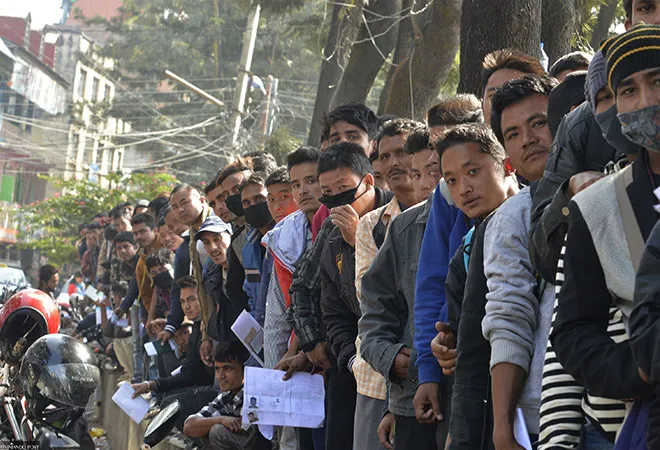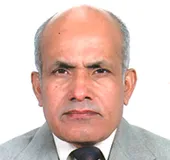
Nepal is in the last phase of completing the
15th Five-Year Plan (2019-2023). One of the major objectives of all the plans was to create employment opportunities in the country, but the country has miserably failed to deliver the expected results on this front. The lack of employment opportunities at home compelled most of the youth to leave the country. Each year the number of youths leaving the country both through legal and illegal channels is increasing. If such a trend continues unabated, it could pose security challenges both within and outside the region.
The lack of employment opportunities at home compelled most of the youth to leave the country.
Of the country’s total population of 30 million,
3.5 to 8 million youths are estimated to be working in India. Other than this, nearly five to six million youth have been working as migrant workers in overseas countries, including Malaysia, Saudi Arabia, Qatar, the United Arab Emirates (UAE), Kuwait, Oman, Bahrain, and South Korea. Of those going to overseas countries for employment,
81 percent are male and 19 percent are females.
Estimates are, that during the fiscal year 2022-23, over
750,000 youth left the country for foreign employment, which is a
record in itself. Each day, over
2,000 youth are leaving the country for employment in overseas countries through the legal channels. Besides, there are also people who illegally immigrate to foreign lands.
As per the estimate of the International Labour Organisation (ILO), the unemployment rate among Nepalese youth between the ages of 15 and 29 years is as high as
19.2 percent. Not finding jobs within the country, the youth force is more desperate today than ever before. Therefore, irrespective of their ideological background, they choose to go abroad for jobs. Even those who once happened to be hardcore Maoist activists during the Maoist insurgency period between 1996 and 2006, in the heartland of Rukum district in the Western hills and who strongly opposed American imperialism at that time, are willing to pay hefty amounts of money to traffickers to get them to the United States. Yet, only the lucky ones among them manage to reach their dreamland as many of them have been
deported while choosing an illegal way.
The Nepalese government believes that the new rule of four-year service under the Agnipath scheme in the Indian Army is against the tripartite agreement between Nepal, India, and Britain in 1947.
Each year,
1,300 Gurkhas used to join the Indian Army, however, following the decision of the Nepalese government to stop the recruitment of the Gurkhas into the Indian Army in 2023, many of them are going overseas in search of jobs. The Nepalese government believes that the new rule of four-year service under the Agnipath scheme in the Indian Army is against the
tripartite agreement between Nepal, India, and Britain in 1947. This could also be one of the reasons why China is trying to influence Nepal to open its door for the
recruitment of the Gurkhas into its People’s Liberation Army (PLA). But, in certain quarters, views are that Nepal cannot allow China to recruit the Gurkhas into its PLA because that requires the decision of at least two-thirds of the members of the Nepalese parliament, which, at the moment, is
unfeasible.
though the Nepalese government has no bilateral pact with Russia to allow Nepalese citizens to work for this country as mercenaries. Even those retired from the Nepal Army are joining the group.
Media reports also confirm that certain
Nepalese youth have not only been fighting for Russia against Ukraine, but they have also been fighting for Ukraine against Russia. However, the Nepalese government finds such activities illegal and declared that there is no government policy to send any Nepalese to work for or against any other country as a mercenary. The Nepalese Embassy in Moscow has also made it clear that the Nepalese citizens who have joined the Wagner Group have done so in their individual capacities.
On 16 May 2023, Russian President Vladimir Putin simplified the process of obtaining Russian citizenship for those foreign nationals who wanted to join the ranks in this war with Ukraine. He also simplified rules for providing Russian citizenship to family members of such people. A
Nepali youth who joined the Wagner group said, “We are being taught how to use modern weapons. Training takes place throughout the day and sometimes even at night. Even during the training period, the salary is about fifty thousand Nepalese rupees, along with insurance. After one year, citizenship is available. If I don’t die in one year, I will live here.”
The Nepalese Embassy in Moscow has also made it clear that the Nepalese citizens who have joined the Wagner Group have done so in their individual capacities.
Though Nepal is not so a big country, it holds the 11
th position in terms of bringing remittances from overseas migrants. As per the data provided by Nepal Rastra Bank, the central bank of the country, the remittance inflows in Nepal increased by 13 percent to
US$8.51 billion in 2023. Nevertheless, it is not a healthy sign of growth for the country. Each year, over
1,242 dead bodies of migrant workers arrive at the Tribhuvan International Airport in Kathmandu from different countries.
The way the Nepalese youth are fleeing the country so desperately for jobs even at the cost of risking their life is a matter of serious concern. This clearly shows that Nepal’s present planning and economic system has utterly failed to address this burning challenge. So, the need of the hour is to restructure the system in a way that employment opportunities are generated within the country on a massive scale and the youth are engaged in productive sectors for the development of the country. But under the current political dispensation, it is unlikely that there would be any breakthrough in this field as neither the government nor the political parties are serious about this. Nevertheless, its possible impacts on regional and international security cannot be overlooked altogether.
Hari Bansh Jha is a Visiting Fellow at the Observer Research Foundation.
The views expressed above belong to the author(s). ORF research and analyses now available on Telegram! Click here to access our curated content — blogs, longforms and interviews.




 PREV
PREV


